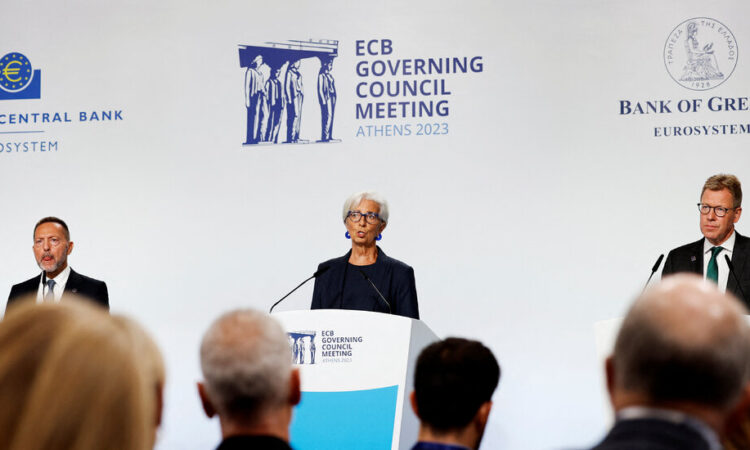
The European Central Bank held interest rates steady on Thursday for the first time in over a year as policymakers moved into their next phase of fighting inflation amid signs the region’s economy has weakened.
Officials have shifted their focus to how long they will need to maintain high interest rates in order to push inflation all the way down to the central bank’s target. The bank, which sets rates for the 20 countries that use the euro, kept the deposit rate at 4 percent, a record high.
“Inflation is still expected to stay too high for too long, and domestic price pressures remain strong,” Christine Lagarde, the president of the central bank, said at a news conference in Athens. “At the same time, inflation dropped markedly” last month and some measures of inflation, which would indicate persistence, have eased, she said.
The decision to hold interest rates was telegraphed last month when, after their 10th consecutive increase, policymakers signaled they might be done. The annual rate of inflation in the eurozone dropped to 4.3 percent in September, from a peak of 10.6 a year ago. But the rate isn’t forecast to return to the central bank’s 2 percent target until the third quarter of 2025, the central bank’s staff projected last month. Core inflation, which strips out volatile food and energy prices, slowed to 4.5 percent last month.
Since July 2022, the European Central Bank has enforced its most aggressive bout of monetary tightening to prevent high inflation taking hold, which was triggered by a surge in energy prices last year. Interest rates were raised from below zero to the highest in the central bank’s two-decade history, and bond-buying programs introduced to stimulate the economy have been shrunk.
This policy stance has restrained economic growth. Earlier this week, the central bank said that demand for loans by firms and households decreased strongly in the third quarter of this year, and more so than initially expected. Separate data published this week showed that business activity in the bloc contracted in October as new orders declined and companies cut jobs.
Past rate increases “continue to be transmitted forcefully into financing conditions,” Ms. Lagarde said on Thursday. “This is increasingly dampening demand and thereby helps push down inflation.”
The region’s economy “remains weak,” she added, and would remain so for the near future as manufacturing output declines, foreign demand is subdued and consumer spending slows.
But with the focus on reining in inflation, policymakers said that if interest rates stay at their current levels for “a sufficiently long duration” inflation should return to target.
However, Ms. Lagarde gave few clues as to how long this would be, nor confirmed that this would be the peak in interest rates. “The fact that we are holding doesn’t mean to say we will never hike again,” she said. Future decisions would depend on incoming economic data, she said, so shouldn’t be pre-empted.
Traders are betting that interest rates will be cut in the latter half of next year as a stretch of restrictive monetary policy takes its toll on the economy. But there has been renewed uncertainty about the path of inflation as energy prices have jumped this month amid the Israel-Hamas conflict, and there are concerns that if the conflict spreads it could send a shock through global energy markets.
“The heightened geopolitical tensions could drive up energy prices in the near term, while making the medium-term outlook more uncertain,” Ms. Lagarde said. Though, at the same time, these tensions could worsen the global economic environment and ultimately ease price pressures, she said.
Ms. Lagarde wouldn’t say how the central bank would react to another surge in energy prices. But she said that scenario would be different from last year, because the economic backdrop has changed after a period marked by high inflation, a rapid increase in interest rates, strong employment but a weakening economy.
All these factors would have to be taken into account, she said, but “be under no doubt our determination is intact” to return inflation to target.
This month’s meeting was held in Athens, just days after Greece’s debt was given an investment grade credit rating by S&P, ending a 13-year period of being classed as junk bonds.
Once a year the central bank hosts its governing council meeting in a different country of the eurozone. This year was the first meeting in Athens since 2008 and has coincided with a turnaround of the Greek economy, where unemployment is the lowest in over a decade and the economy has grown strongly in recent years. “Greece has demonstrated phenomenal recovery capacity,” Ms. Lagarde said.





